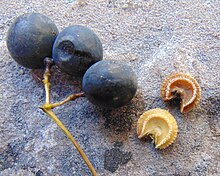| Menispermaceae Temporal range: [1]
| |
|---|---|

| |
| Menispermum canadense | |
| Scientific classification | |
| Kingdom: | Plantae |
| Clade: | Tracheophytes |
| Clade: | Angiosperms |
| Clade: | Eudicots |
| Order: | Ranunculales |
| Family: | Menispermaceae Juss.[2] |
| Genera[3] | |
|
78, see text | |
Menispermaceae (botanical Latin: 'moonseed family' from Greek mene 'crescent moon' and sperma 'seed') is a family of flowering plants. The alkaloid tubocurarine, a neuromuscular blocker and the active ingredient in the 'tube curare' form of the dart poison curare, is derived from the South American liana Chondrodendron tomentosum. Several other South American genera belonging to the family have been used to prepare the 'pot' and 'calabash' forms of curare. The family contains 78 genera[3] with some 440 species,[4] which are distributed throughout low-lying tropical areas with some species present in temperate and arid regions.
- ^ Krassilov, Valentin; Golovneva, L.B. (2004). "A minute mid-Cretaceous flower from Siberia and implications for the problem of basal angiosperms". Geodiversitas. 26: 5–15.
- ^ Angiosperm Phylogeny Group (2009). "An update of the Angiosperm Phylogeny Group classification for the orders and families of flowering plants: APG III" (PDF). Botanical Journal of the Linnean Society. 161 (2): 105–121. doi:10.1111/j.1095-8339.2009.00996.x. hdl:10654/18083. Retrieved 6 July 2013.
- ^ a b Menispermaceae Juss. Plants of the World Online. Retrieved 21 January 2024.
- ^ Christenhusz, M. J. M. & Byng, J. W. (2016). "The number of known plants species in the world and its annual increase". Phytotaxa. 261 (3): 201–217. doi:10.11646/phytotaxa.261.3.1.